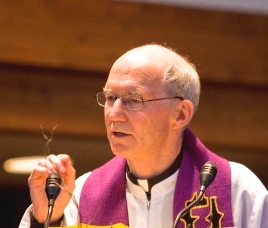We can address this question on two levels: First, that God made us free and we have abused our freedom bringing terrible suffering on each other. That's true enough but the Bible takes us to a deeper level. The prophets had to ask why God allows disasters such as the destruction of Jerusalem with its magnificent Temple. Built by King Solomon, for the Jewish people the Temple was more precious than life itself. Why did God allow the Babylonians to destroy that Temple? The prophets conclude that God permits catastrophes so he can bring us back to himself. We easily become proud-minded and that arrogance separates us from God and from others. God loves humility because it opens us to him and to each other.
We see that in today's reading: St. Paul says to be subordinate one to another out of reverence for Christ. We tend to focus on the submission of wife to husband, but God requires a similar humility when he says, "husbands, love your wives as Christ loves the church." Jesus is never domineering and rude. Rather he gently leads. That's what we want from our young men: to be self-giving leaders and strong protectors.
A while back I told you about studies showing that our young people dream about marriage - even traditional marriage where a husband makes most of the decisions. This presumes dialogue: recognizing a woman's abilities that she needs to develop and use to the maximum. Remember the parable of the talents. I see that in our parish staff. We are blessed by young moms who put their extraordinary gifts at the service of the church. At the same time what matters most to them are their marriages and families.
St. Paul speaks about this great mystery: the two become one flesh. As he says this refers to Christ and his bride the church.
This mystery ties with today's Gospel - which is the conclusion of Jesus' discourse on the Bread of Life. What he says about eating his flesh and drinking his blood seems so shocking than many leave him. Jesus asks his intimate disciples, "Will you too leave me?" This question resounds today. So many have become scandalized, discouraged and embarrassed to follow Jesus. He asks, Will you too leave me?
There's been a lot of horrible news in our country - and in our church. Archbishop Sartain addresses it in a letter I put in the bulletin. We naturally feel disappointed about our leaders. Heck, I feel disappointed about myself. At the same time God does not tell us to trust in men - only in one man: Jesus. We need to hear him ask, "Will you too leave me?"
As we conclude this summer series, please consider Peter's response: "Master to whom shall we go?" No one else has made such extraordinary claims - not the Buddha, not Mohamed, not Confucius. Those men claim to show the way. Only Jesus says, "I am the way - and the truth and the life...I am the Living Bread," he says, then asks "Will you too leave me?" With Peter we respond, "Master, to whom shall we go? We have come to believe and are convinced that you are the Holy One of God." Amen.

 RSS Feed
RSS Feed
